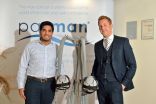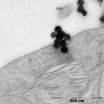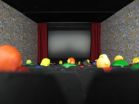(Press-News.org) Cancer suffers who lose their hair as a consequence of chemotherapy will benefit from a major research project that will improve the scalp cooling technology that prevents hair loss.
The research is being now underway and is being pioneered by global scalp cooling manufacturing company, Paxman Coolers, of Fenay Bridge, Huddersfield, in conjunction with the biology department of the University of Huddersfield.
The research will be led by key researcher Omar Hussain, who has a background in the pharmacology of cancer treatment, which he will use towards his PhD.
Omar joined Paxman's originally as a researcher on a joint government-sponsored Knowledge Transfer Partnership between the company and the university designed to establish the scientific basis of scalp cooling and its success rate with different drugs.
He was supervised by the University's Dr Nik Georgopoulos and Dr Andrew Collett and he co-authored an article in the specialist journal Toxicology in Vitro on the findings of the project.
For Paxman's Managing Director, Richard Paxman, the research represents an exciting development that will enable further improvements in the treatment and the technology.
"When a patient comes to us and asks what the chances are of keeping their hair, at the moment we are very fair and say they are 50 per cent. Now we want to take that up to 80 per cent and we believe that greater understanding of the scientific mechanisms will allow us to do that," he said.
Omar Hussain – who has presented his research at several international conferences, in tandem with a Paxman team – described how he replicated the effect of scalp cooling in laboratory conditions.
Cells were taken from hair follicles and subjected to a simulation of chemotherapy treatment. Experiments were conducted with different levels of temperature, from 37 degrees C – the normal temperature of the human body – and then lowered. As the temperatures fell, cell survival increased.
"Compared with 37 degrees there are huge differences," said Omar. "At low temperatures, cells are being rescued and maintained well and this promotes the cooling effect." He added that the optimum temperature for scalp cooling is yet to be finalised, although it is below 22 degrees C.
After extensive testing and research – with Omar closely involved – Paxman Coolers plans to launch a fourth generation scalp cooler in 2016. Richard Paxman said that acceptance of scalp cooling technology was initially slow during the early years of development, but sales have grown by at least 20 per cent annually for the past five years and are expected to accelerate further. Export business is especially strong.
INFORMATION: END
New technology on the way to aid cancer suffers who lose their hair after chemotherapy
Global scalp cooling manufacturers to pioneer new research design to reduce chances of hair loss by 80 percent
2014-10-29
ELSE PRESS RELEASES FROM THIS DATE:
EEG test to help understand and treat schizophrenia
2014-10-29
Researchers at University of California, San Diego School of Medicine have validated an EEG test to study and treat schizophrenia. The findings, published in two separate studies, offer a clinical test that could be used to help diagnose persons at risk for developing mental illness later in life, as well as an approach for measuring the efficacies of different treatment options.
One of the studies, reported online Oct. 23 in Schizophrenia Research, shows that schizophrenia patients don't register subtle changes in reoccurring sounds as well as others and that this deficit ...
Decades of research: Effectiveness of phone counseling for cancer patients still unknown
2014-10-29
Increasingly, cancer care respects the fact that a patient's body is only part of the system that requires treatment. Over a third of cancer patients experience psychosocial distress – the mental health consequences of their conditions. And, increasingly, care providers are exploring phone- and internet-based interventions to help cancer patients navigate mental health challenges. A University of Colorado Cancer Center study recently published in the journal Psycho-Oncology asks an important question: after decades of use and study, can we definitely show that remote ...
Supersonic laser-propelled rockets
2014-10-29
WASHINGTON, Oct. 29, 2014—Scientists and science fiction writers alike have dreamt of aircrafts that are propelled by beams of light rather than conventional fuels. Now, a new method for improving the thrust generated by such laser-propulsion systems may bring them one step closer to practical use.
The method, developed by physicists Yuri Rezunkov of the Institute of Optoelectronic Instrument Engineering, Russia and Alexander Schmidt of the Ioffe Physical Technical Institute in Saint Petersburg, Russia is described today in The Optical Society's (OSA) journal Applied ...
Can plants edge out petroleum as raw material for textiles and plastics?
2014-10-29
Your next pair of spandex pants could be made out of corn — or, more precisely, from dextrose derived from corn. This option is part of a new wave, albeit a small one, of consumer goods that are being produced from plants rather than petroleum-based materials. But a complete transition to a biobased economy won't be easy, according to an article in Chemical & Engineering News (C&EN), the weekly newsmagazine of the American Chemical Society.
Melody M. Bomgardner, a senior editor at C&EN, notes that a range of companies, from start-up firms to industrial giants, have ...
Nanosafety research: The quest for the gold standard
2014-10-29
Researching the safety of nanoparticles is all the rage. Thousands of scientists worldwide are conducting research on the topic, examining the question of whether titanium dioxide nanoparticles from sun creams can get through the skin and into the body, whether carbon nanotubes from electronic products are as hazardous for the lungs as asbestos used to be or whether nanoparticles in food can get into the blood via the intestinal flora, for instance. Public interest is great, research funds are flowing – and the number of scientific projects is skyrocketing: between ...
Free urban data -- what's it good for?
2014-10-29
New Rochelle, October 29, 2014 –Cities around the world are increasingly making urban data freely available to the public. But is the content or structure of these vast data sets easy to access and of value? A new study of more than 9,000 data sets from 20 cities presents encouraging results on the quality and volume of the available data and describes the challenges and benefits of analyzing and integrating these expanding data sets, as described in an article in Big Data, the highly innovative, peer-reviewed journal from Mary Ann Liebert, Inc., publishers. The Open ...
To reap the brain benefits of physical activity, just get moving!
2014-10-29
This news release is available in French. Everyone knows that exercise makes you feel more mentally alert at any age. But do you need to follow a specific training program to improve your cognitive function? Science has shown that the important thing is to just get moving. It's that simple. In fact, this was the finding of a study conducted at the Institut universitaire de gériatrie de Montréal (IUGM), an institution affiliated with Université de Montréal, by Dr. Nicolas Berryman, PhD, Exercise Physiologist, under the supervision of Dr. Louis Bherer, ...
Meiotic cell division 'the other way round'
2014-10-29
This news release is available in German. Meiosis is not like another: Gabriela Cabral and Peter Schlögelhofer at the Max F. Perutz Laboratories (MFPL) of the University of Vienna and the Medical University of Vienna dived into the process of meiosis in specific plant species and revealed that these plants display an inversion of the standard meiotic phases. The researchers describe the detailed mechanisms in the scientific journal Nature Communications.
Meiosis is the two-step series of cell divisions that make sexual reproduction and genetic diversity possible.The ...
A mechanism that allows a differentiated cell to reactivate as a stem cell revealed
2014-10-29
One kind of stem cell, those referred to as 'facultative', form part—together with other cells—of tissues and organs. There is apparently nothing that differentiates these cells from the others. However, they have a very special characteristic, namely they retain the capacity to become stem cells again. This phenomenon is something that happens in the liver, an organ that hosts cells that stimulate tissue growth, thus allowing the regeneration of the organ in the case of a transplant. Knowledge of the underlying mechanism that allows these cells to retain this ...
Cinema-like environment helps audiences immerse in movies even on small screens & displays
2014-10-29
If the surroundings are designed to be sufficiently stimulating, even a simple computer screen is enough to generate an intense cinematic experience. After observing some 300 study subjects, researchers at the Institute of Psychology of Johannes Gutenberg University Mainz (JGU) in Germany concluded that the angle of viewing does not play a vital role in the cinematic experience, thus disproving various hypotheses. According to the results of their study, the presence of so-called contextual visual cues plays a greater role in actually drawing viewers into a movie. When ...
LAST 30 PRESS RELEASES:
Study highlights increased risk of second cancers among breast cancer survivors
International DNA Day launch for Hong Kong’s Moonshot for Biology
New scientific resources map food components to improve human and environmental health
Mass General Brigham research identifies pitfalls and opportunities for generative artificial intelligence in patient messaging systems
Opioids during pregnancy not linked to substantially increased risk of psychiatric disorders in children
Universities and schools urged to ban alcohol industry-backed health advice
From Uber ratings to credit scores: What’s lost in a society that counts and sorts everything?
Political ‘color’ affects pollution control spending in the US
Managing meandering waterways in a changing world
Expert sounds alarm as mosquito-borne diseases becoming a global phenomenon in a warmer more populated world
Climate change is multiplying the threat caused by antimicrobial resistance
UK/German study - COVID-19 vaccine effectiveness and fewer common side-effects most important factors in whether adults choose to get vaccinated
New ultraviolet light air disinfection technology could help protect against healthcare infections and even the next pandemic
Major genetic meta-analysis reveals how antibiotic resistance in babies varies according to mode of birth, prematurity, and where they live
Q&A: How TikTok’s ‘black box’ algorithm and design shape user behavior
American Academy of Arts and Sciences elects three NYU faculty as 2024 fellows
A closed-loop drug-delivery system could improve chemotherapy
MIT scientists tune the entanglement structure in an array of qubits
Geologists discover rocks with the oldest evidence yet of Earth’s magnetic field
It’s easier now to treat opioid addiction with medication -- but use has changed little
Researchers publish final results of key clinical trial for gene therapy for sickle cell disease
Identifying proteins causally related to COVID-19, healthspan and lifespan
New study reveals how AI can enhance flexibility, efficiency for customer service centers
UT School of Natural Resources team receives grant to remove ‘forever chemicals’ from water
Sweet potato quality analysis is enhanced with hyperspectral imaging and AI
Use of acid reflux drugs linked to higher risk of migraine
For immigrants to Canada, risk of MS increases with proportion of life spent there
Targeted use of enfortumab vedotin for the treatment of advanced urothelial carcinoma
A university lecture, with a dash of jumping jacks
How light can vaporize water without the need for heat
[Press-News.org] New technology on the way to aid cancer suffers who lose their hair after chemotherapyGlobal scalp cooling manufacturers to pioneer new research design to reduce chances of hair loss by 80 percent







